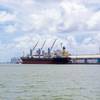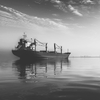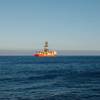by Dennis L. Bryant, Senior Counsel, Haight Gardner Holland & Knight
When the federal government began examining United States vulnerabilities in the days following the horrific terrorist attacks of September 11, 2001, it quickly became apparent that significant weakness existed on the U.S. maritime borders. Many, but not all, of these weaknesses were systemic and derived from both the U.S. open society and the procedures underlying modern maritime commerce. The goal quickly became to reduce the risk of maritime terrorism while not fundamentally altering the efficiencies of the commercial system.
It was quickly realized that the threat to the maritime sector consisted of two distinct types: explosives and other contraband being shipped as cargo (particularly in a container) and the ship being used as a weapon, with or without explosives on board. It was further realized that the problem was worldwide; that an attack on the port of Singapore could be just as devastating to international commerce as an attack on the port of New York.
In the United States, the Customs Service is the lead agency regarding cargo security and the Coast Guard is the lead agency regarding vessel security. The challenge is huge. Over 7,500 foreign flag vessels make over 51,000 port calls in the United States annually. More than 200 million containers move through U.S. ports each year and only about 2% are currently inspected.
The U.S. Coast Guard rapidly established over 100 security zones at major ports around the United States. It required ships coming to U.S. ports to report their intentions sooner (96 hours in advance, rather than 24 hours prior to arrival) and to include more detailed information regarding such things as the identity of the persons onboard and the cargo being carried.
Vessels are now subject to being boarded by Coast Guard 'Sea Marshals,' who check for terrorists. Shore leave for crewmembers is increasingly difficult to obtain following crackdowns by the Immigration and Naturalization Service (INS) and strict enforcement of that agency's regulations. The Customs Service has increased its scrutiny of cargoes (particularly containerized cargo) and the Animal and Plant Health Inspection Service (APHIS) of the Department of Agriculture is looking for attempted bio-terrorism.
Congress has also taken up the challenge. The Senate passed the Port and Maritime Security Act of 2001 (S. 1214). The House of Representatives passed the Maritime Transportation Antiterrorism Act of 2002 (H.R. 3983). Both houses have recently named their representatives to the Conference Committee that will attempt to resolve the differences between the two bills.
Department of Homeland Security
President Bush has now proposed establishment of a new Department of Homeland Security to focus efforts on protection of the United States from these new asymmetric threats. The Department would be formed by transferring a number of agencies from other departments.
The U.S. Coast Guard and the Transportation Security Administration (TSA) would come from the Department of Transportation. The Customs Service and the Secret Service would come from the Treasury Department. The INS would come from the Justice Department. APHIS would come from the Agriculture Department. The Federal Emergency Management Agency (FEMA), currently an independent agency, would be rolled into the new Department.
Two questions arise with respect to maritime aspects of the new Department. One, should the Maritime Administration (MARAD) be included? In many aspects, MARAD's missions relate more to homeland security than they do to transportation. Two, will Congress better define the role of TSA as it relates to maritime security? The Coast Guard has extensive and detailed port and maritime security authority. The role of TSA in this arena is vague. A possible solution to both questions would be to combine MARAD and the TSA.
The proposed legislation for establishment of the Department of Homeland Security specifically provides that the Coast Guard (as well as the Secret Service) is to be maintained as a distinct entity within the new Department, as it has been within the Department of Transportation. The bill also provides that current provisions of Title 14, U.S. Code where the term "of Transportation" appears are to be amended to read "of Homeland Security." This is fine, as far as it goes. There are, though, functions performed by the Coast Guard that are statutorily assigned to the Secretary of Transportation and that are not found in Title 14 of the U.S. Code. The statutes underlying these functions, such as authority to establish and regulate anchorage grounds, authority to determine whether a bridge is an obstruction to maritime navigation, authority to regulate drawbridges, and authority to regulate deepwater ports, should be amended concurrently with the transfer of the Coast Guard to the new department so as to avoid future problems. The President fully recognizes that the Coast Guard performs, and will continue to perform, missions not directly related to homeland security.
A more difficult situation relates to hazardous materials transportation. The statute underlying this program created a true multimodal regime, covering ground, rail, and air, as well as maritime transportation. Congress and the concerned agencies must be truly creative with regard to this aspect of the Coast Guard's transfer so as to not adversely affect this important program.
Maritime Security Bills
Returning to the pending maritime security legislation, the Senate and the House have taken somewhat different approaches. The Senate bill was originally introduced long before the terrorist attacks and focused on issues related to crime on the waterfront. After September 11, the bill was extensively modified to subsume antiterrorism issues, but its original roots are still evident. The House bill was drafted subsequent to September 11 and is largely focused on antiterrorism.
From the broad perspective, the Senate bill includes almost all the maritime security topics addressed in the House, with the exception of automatic identification systems (AIS) for ships. On the other hand, the Senate bill contains a number of provisions not found in the House bill, such as establishment of a maritime security advisory committee, recognition of maritime domain awareness, provision for maritime security professional training, and mandating shared dockside inspection facilities.
Compromises will have to be negotiated between Senate and House differences relating to such items as foreign port assessments and what happens when a foreign port is found to be excessively vulnerable to terrorist action. The House bill allows the Coast Guard to prescribe conditions for entry into the United States by ships arriving from those ports. The Senate bill goes further and would allow the Coast Guard to prohibit vessels from providing service between the United States and a foreign port served by vessels navigating to or from a port found not to maintain and carry out effective security measures. This latter provision seems both excessive and unenforceable in a practical sense.
Maritime labor unions can be expected to have objections to the provision in the Senate bill that would deny entry into maritime controlled access areas to persons convicted for specified crimes. The House bill is more narrowly crafted, only prohibiting issuance of transportation security cards to persons convicted of a felony that the Coast Guard believes could be a terrorism security risk to the United States. The House bill also addresses foreign workers, such as crewmembers, who would be eligible for a transportation security card unless they are not eligible for admission to the United States under the immigration laws.
Both bills would require U.S. port facilities and commercial vessels calling in U.S. ports to have security plans. The House bill, though, has taken a page from the Oil Pollution Act of 1990 (OPA 90) and would require facilities and vessels to identify a designated person with authority to implement the antiterrorism plan and to ensure by contract or other approved means the availability of antiterrorism measures necessary to deter a catastrophic emergency or a substantial threat of such a catastrophic emergency. It is unclear what 'antiterrorism measures' are envisioned. Hopefully, the Coast Guard can put flesh on these bones. (It should be noted that vessel security plans are already required for large passenger vessels and for certain cargo vessels under contract to the Military Sealift Command.)
Enhanced cargo identification and tracking (particularly with regard to containerized cargo) is envisioned by both the Senate and House bills. Both would mandate development of standards to improve security of containers, with particular emphasis on seals ands locks. The Senate bill also provides for tracking containers by means of the Global Positioning System (GPS) or an alternative method.
International Issues
Neither bill plays serious attention to international comity. The measures proposed are largely unilateral and ignore efforts ongoing at the International Maritime Organization (IMO) to craft multinational solutions to the international threat of terrorism. Senator Breaux (D-LA) has introduced the Ship, Seafarer, and Container Security Act of 2002 (S. 2329), which would provide a 24-month window for the adoption of international agreements on a seafarer identification system, transparency of ship registration, and container integrity before unilateral measures would be considered by the United States.
It is readily apparent that, as it did with OPA 90, the United States is fully prepared to adopt unilateral approaches to maritime security issues. It can only be hoped that measures such as those proposed by Senator Breaux will find their way into the final bill and that the final bill provides the Coast Guard and other implementing agencies sufficient discretion to allow crafting of regulations that will comport with the developing international standards to the maximum possible extent.
Current Initiatives
Those involved in maritime security are not waiting for Congress and the White House. Initiatives are underway, both domestically and internationally, to further reduce vulnerabilities in the maritime sector.
The IMO has scheduled a diplomatic conference for December 2002 to consider a draft Convention on Maritime Security. The convention, preparatory work on which has been done by the Legal Committee, the Maritime Safety Committee, and an Ad Hoc Intersessional group, would address such issues as advancing installation dates for AIS on ships engaged in international commerce; ship and port facility security plans; and requirements for port vulnerability assessments. The International Labor Organization (ILO) is in the process of drafting a Protocol on Universal Seafarer Identification Documents. The Organization for Economic Cooperation and Development (OECD) has established an Ad-Hoc Working Group on Security as part of its Maritime Transportation Committee. Member states of the Organization of American States (OAS) recently signed the Inter-American Convention Against Terrorism. Among other things, this convention obligates members to make offenses under the International Convention for the Suppression of Unlawful Acts against the Safety of Maritime Navigation and the Protocol for the Suppression of Unlawful Acts against the Safety of Fixed Platforms Located on the Continental Shelf domestic crimes. Further, the states committed themselves to promote cooperation and exchange of information to improve border and customs control measures.
Domestically, the Coast Guard has established a program for electronic submittal of advance notices of arrivals and is moving toward making this submittal method mandatory. It has established a Maritime Safety and Security Team (MSST) in Seattle and is planning to locate additional MSSTs in Chesapeake, Virginia, Los Angeles/Long Beach, and Houston/Galveston. The MSST is a domestic mobile unit possessing specialized training and capabilities to perform a broad spectrum of port safety and security operations.
A charter establishing Boston as a Model Port was signed recently by representatives from the Coast Guard, Customs Service, FBI, INS, the Massachusetts Office of Commonwealth Security, the Massachusetts Emergency Management Agency, Massport, the City of Boston Police and Fire Departments, the Metropolitan Mayors Coalition, Irving Oil, and Tractebel LNG/Distrigas. The model port project gathers and provides information regarding current security and safety practices in supply chains and critical port activities; assists in collaborative efforts to develop and share best practices; and tests and evaluates security technology and practical solutions.
The Department of Transportation successfully completed a test of new technology that will help secure cargo containers entering ports and border crossings throughout the United States. The test involved use of electronic seals (E-Seals), a radio frequency device that transmits shipment data as it passes reader devices and indicates if a container has been compromised. The Research and Special Programs Administration (RSPA) issued voluntary measures that shippers and carriers may undertake to enhance security of hazardous materials while they are in transport. The measures were developed in consultation with industry and the emergency response community. RSPA recommends development of a security plan, security familiarization training for employees, and installation of tamper-proof seals, among other things. The United States and Canada had developed the Smart Border Action Plan. Among other things, the Plan provides that Canada and the U.S. will establish joint teams of customs officials in the ports of Vancouver, Montreal, Halifax, Seattle-Tacoma, and Newark to target marine containers destined for either country at their first port of arrival in North America.
The U.S. Customs Service has initiated two programs to enhance security. Under the Customs-Trade Partnership Against Terrorism (C-TPAT), importers who adopt certain voluntary measures to enhance security of their cargoes will receive expedited processing by Customs when those goods arrive in the United States. Under the Container Security Initiative (CSI), the agency is partnering with foreign governments to place U.S. Customs Service inspectors in major foreign seaports to help those governments screen cargoes bound for the U.S. even before they are loaded on ships. The goal is to push out the zone of security as far as possible. Agreement has been reached to place such inspectors in Singapore to work with local officials to pre-screen containers bound for the U.S. The Customs Service is currently in discussions with several other nations, including countries in Europe and Asia, about forming partnerships under CSI.
Conclusion
Maritime security in the United States has been significantly enhanced since the terrorist attacks of September 11. It will be enhanced further following enactment of the new maritime security legislation, promulgation of implementing regulations, and establishment of the Department of Homeland Security. It must be remembered, though, that the goal is risk reduction. Total security is unachievable.
The international community is concerned, rightly so, that the United States is engaged in another of its unilateral crusades, reminiscent of OPA 90. There is little doubt that both the Congress and the White House are proceeding will all deliberate speed to strengthen the security of the U.S. homeland, including its maritime borders. It can only be hoped that international efforts don't lag too far behind and that wise heads can find commonality in the U.S. and international approaches to this multinational problem. The commercial sector, carriers and shippers, are also concerned, again with justification, which increased security requirements will drive up costs and increase delays in transit. They are correct. Changes have been imposed and more are coming. Governmental entities at the international and national level are imposing requirements that will alter the way business is conducted. I sincerely urge responsible members of the commercial sector to participate in the process - not to stop intended changes, but to prevent governments from making unintended changes.
Dennis L. Bryant is Senior Counsel in the Washington, DC office of Haight Gardner Holland & Knight. He retired in 1995 after 27 years active duty with the U.S. Coast Guard. His last assignment with the Coast Guard prior to retirement was to supervise that agency's implementation of the Oil Pollution Act of 1990 (OPA 90).
Sponsored Content
Chris-Marine’s solutions help to prolong engine lifetime

Subscribe for
Maritime Reporter E-News
Maritime Reporter E-News is the maritime industry's largest circulation and most authoritative ENews Service, delivered to your Email five times per week









